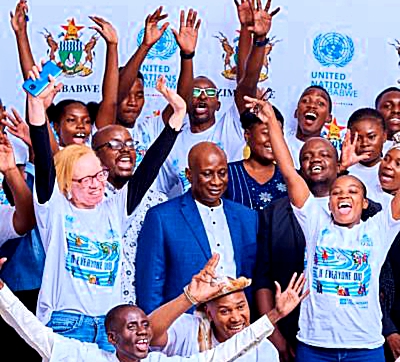TAKUDZWA HILLARY CHIWANZA
HARARE – The United Nations Development System's work in Zimbabwe has been showcased in a recent newsletter, highlighting joint campaigns, initiatives, and partnerships aimed at addressing critical social, economic, and environmental issues for sustainable development.
 |
| Image: United Nations Zimbabwe |
The UN Resident and Humanitarian Coordinator, Edward Kallon, expressed hope that sustainable development can become a solid, concrete reality in Zimbabwe through concerted efforts from all stakeholders.
Under the theme of accelerating progress towards the Sustainable Development Goals (SDGs), Zimbabwe has witnessed a concerted effort from various stakeholders to support the government in key areas such as youth engagement, combatting HIV/AIDS, eliminating mother-to-child transmission of HIV, and fostering community leadership in the fight against AIDS.
One notable event, the Youth for SDGs summit held in 2023, emphasized the pivotal role of young Zimbabweans in driving positive change and advancing the nation's development agenda.
The summit also underlined the importance of providing quality education and skills development to prepare the youth for their future contribution to Zimbabwe's progress.
Collaborations between the UN, government, and various organizations have been instrumental in the fight against HIV/AIDS, promoting inclusivity, innovation, and community engagement.
Efforts to eliminate mother-to-child transmission of HIV, celebrate achievements in eradicating violence against women and girls, and promote gender equality have been significant steps towards building a more equitable and healthier society, with a focus on leaving no one behind.
The involvement of the private sector holds promise for Zimbabwe's economic growth and the realization of the SDGs, particularly through sustainable industrialization and green technology.
This demonstrates a forward-looking approach to economic development and environmental sustainability.
Addressing climate change and building community resilience have also been key priorities, drawing lessons from the Zimbabwe Idai Recovery Programme. Additionally, the advancement of green technology in Zimbabwe serves as an important reference point for sustainable development.
The UN's partnerships in enhancing development results reporting, advocating for investment in women and girls, showcasing devolution success, and ensuring education for refugees further underscore the commitment to inclusivity, local empowerment, and community-based development.
These ongoing efforts, partnerships, and initiatives by the UN in Zimbabwe reflect a strong commitment to support inclusive and sustainable development.
The collaboration and innovation demonstrated are crucial in accelerating progress towards the SDGs and achieving national development priorities outlined in the 2021-2025 National Development Strategy and Vision 2030, which aims to transform Zimbabwe into an upper middle-income society.
















.jpg)





.jpg)
0 Comments